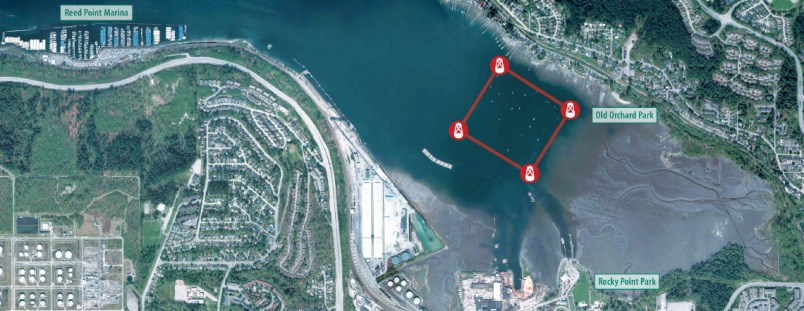It’s going to cost boaters $200 a day if they anchor overnight in the Port Moody arm of Burrard Inlet without a permit.
On Tuesday, Port Moody council adopted new bylaws that allow enforcement officers to issue the fines.
In July 2016, the city and Vancouver Fraser Port Authority created a designated anchorage area (DAA) in the inlet to discourage boats from being moored year-round and to eliminate derelict and abandoned craft from local waters.
To drop anchor for the night, boaters are required to register with the city for a permit that allows them to stay up to 21 nights in a 40-day period at a cost of $12 per night. (A $500 refundable damage deposit that was also required in the program’s first year was subsequently dropped after complaints from boaters.)
The city monitors the area within the designated anchorage zone while Vancouver Fraser Port Authority is responsible for the waters outside the DAA, which is marked by special buoys and GPS coordinates.
But a report by Port Moody’s sustainability and energy specialist, Angela Crampton, said the lack of a city bylaw that would allow it to impose fines on boaters who don't have the required permit, as well as challenges of enforcing the bylaw, led to a decrease in the number of permits purchased.
In its first year of implementation, 24 permits were issued to overnight users for a total of 115 days, generating fees of $1,332. But in the second year, only 17 permits for 64 days of use were issued.
“The decrease may reflect challenges with the permit process or increasing boater perception of minimal enforcement,” Crampton said in her report.
That enforcement consisted of bylaw officers using private water craft to respond to complaints but, without a bylaw, they were unable to write tickets for infractions.
Crampton also recommended the new bylaw be supported by “a more robust on-water presence” by enforcement staff, including targeted monitoring during busy weekends on the water as well as formalized partnerships with private boat owners and, possibly, Coquitlam RCMP’s marine unit so bylaw officers can get out to the boats to check for permits.
Crampton said the city will also try to find ways to make it easier for boaters to purchase the required permits on weekends.
3/22: An earlier version of this story had an outdated name for Vancouver Fraser Port Authority



